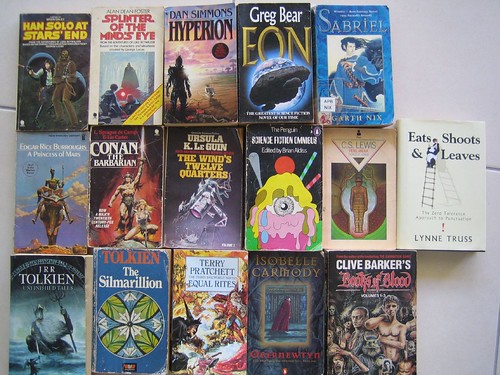I was reading a blog entry (or blessay, if you will) by the excellent Stephen Fry this morning on language, pedantry and pleasure, and a few thoughts have been percolating. Some of this is brain-dump material, but, as always, I’m not trying to make you think the same as me. I’m just trying to make you think.
I think about language often. I collect words and phrases hither and thither. I make up funny (in the dual senses of humourous and strange) little rhymes or phrases or songs to amuse myself. I make up words for their sound or their feel (there aren’t nearly enough ideophones for my tastes), or because they fill a much-needed gap. I’ve spent idle hours wondering at the fact that our writing and speaking voices are comfortable in different registers and with different idioms. You might say that makes me a geek, and to that I say “well spotted” in a sort of dry sarcastic font remarkably similar to my everyday speaking font. I am indeed a language geek, among my other geekeries. I’m sure most of my (two?) readers are geeks in a few ways themselves. Language as a love for me, however, is an artistic rather than intellectual pursuit.
Anyone who knows me well will attest to the fact that I have an abiding love for words and language. I delight in wordage. In building and sculpting and tweaking phrases that trip or flow over the tongue of the mind with just the right taste. In distilling from these scratchings on silicon or paper or stone an essence composed of not just an intellectual concept, but also primal elements of emotion: a touch of familiarity, a dash of awe, a sprinkling of forbidden thrill. The connections with stories, another of my great loves, should be obvious. One connection worth pointing out, however, is that neither of them are really worth bothering with unless you’re at least trying to do something new. At some point that means breaking rules. And, indeed, as long as the communication aspect is not interfered with it’s tough to make a case for ‘knowing the rules before you break them’. Which quite neatly (as if it were happenstance) brings me around to the pedantry aspect.
As a sometime amateur futurist (purely for the purposes of self-amusement, you must understand) I feel I must ascribe any pedantry I hold over the usage of language to a vested interest in our ability as human beings to communicate, and to continue to be able to communicate. I applaud creativity in language, even if I sometimes cringe at new words or ‘creative misspellings’. Two parties need a common set of rules in order to communicate, however, and I see those rules potentially breaking down in two ways: dilution and divergence. Don’t get me wrong, the last thing I want to do is stifle the growth and evolution of language. And don’t think I’m unaware of the fact that people have been prematurely despairing the demise of languages for as long as they’ve had words to allow them to do so. I posit that the internet changes the playing field, however. Anyway, I’m not asking anyone to stop doing anything. Let’s just say I’m watching with interest.
The first concern is the dilution of language. Let’s take that perennial example of internet forums and comments, there/they’re/their. Using your eyes you’re sure to see there that they’re distinct words, but their usage in general would seem to contend that all three are valid spellings of one word with three very distinct meanings. Don’t get me wrong, I’m not some forum vigilante who flits from board to board righting the writing of the many, but I do see that loss of distinction as something to be lamented. Ideally they wouldn’t be homophones to begin with. It’s not like we’ve run out of potential words. I submit that gryzik/they’re/flibbin would be less confusing, assuming we all learned it from an early age. As long as communication isn’t affected, the effect of all this is negligible, but I still don’t feel that losing words is a good thing under any circumstances.
The second concern is the divergence of language. Here’s the thing: the internet is the Tower of Babel all over again. Not just in that we’ve built something bigger than any of us could even conceive individually, nor indeed in that large parts of it are built solely to demonstrate to others just how clever the builders are. Perhaps more than any invention of humanity, this is the one thing that echos “nothing will be restrained from them, which they have imagined to do.” To some, it seems to pave the way to the long-sought-after Tribe of Humanity. The danger is that people get caught up in the smaller tribes. The Tribe of Mac and the Tribe of PC are good examples of this, or the Tribe of Facebook and the Tribe of Myspace. The fact is that the connecting properties of the internet bring together tribes that couldn’t possibly have existed before, to the point where everything is a tribe these days. Microcultures spring up around the smallest of shared experiences, spawning memes and traditions and yes, even language. If I identify with even as few as a dozen tribes, and you another wholly distinct dozen we each have large tracts of our language space inaccessible to the other. As an unqualified amateur observer, I only see these trends accelerating. Let’s just hope we don’t all end up speaking different languages. Still, for the most part, I think it’s brilliant. You can’t make the omelet of the Tribe of Humanity without breaking a few memetic eggs. More than that, the internet is one of the single greatest advancements or advancers of human science and culture, and it only works because everything is (at least in potentia) on the internet. (Which is yet another reason why liberty-eroding internet censorship schemes such as the horrific ‘Clean Feed’ debacle will either fail, or result in massive community efforts to transmute the internet into something that simply cannot be corralled.) So, lest ye be called a n00b, embrace the blogosphere, and the podcast and the vodcast, and the lolspeak that is even now in ur tubes.
But if you ‘LOL’ out loud, as it were, we’re going to have to have words.


















